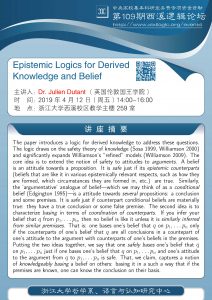Julien Dutant: Epistemic Logics for Derived Knowledge and Belief
西溪逻辑论坛第109期
 Date: 12 April 2019 (14:00-16:00)
Date: 12 April 2019 (14:00-16:00)
Venue: Room 259, Main Teaching Building, Xixi Campus, Zhejiang University
Speaker: Dr. Julien Dutant (King’s College London)
Title: Epistemic Logics for Derived Knowledge and Belief
Abstract:
You have derived knowledge when you know something on the basis of something else. Inferential knowledge is a pardigm example of derived knowledge: if you come to know q by inference from p1, …, pn, then you know q on the basis of p1, …, pn. Derived knowledge raises for questions. (a) Logical (non-)omniscience: that q is entailed known p1, …, pn is not sufficient for knowing q on their basis. So what suffices? (b) Inductive knowledge: that q is entailed by p1, …, pn is not required for knowing q of their basis. So what is required? (c) Closure: a partial answer to (a) is that, when q is entailed known p1, …, pn, by is additionally required is that one competently deduces q from p1, …, pn. What is competent deduction? Is it sufficient for derived knowledge? (d) Counter-closure: a partial answer to (b) is that inference and basing cannot yield knowledge unless the premises or bases are known. In the deductive case, this is the counter-closure idea what is believes solely on the basis of premises that are not known is not known. Is knwoledge of the premises required?
The paper introduces a logic for derived knowledge to address these questions. The logic draws on the safety theory of knowledge (Sosa 1999, Williamson 2000) and significantly expands Williamson’s “refined” models (Williamson 2009). The core idea is to extend the notion of safety to attitudes to arguments. A belief is an attitude towards a proposition. It is safe just if its epistemic counterparts (beliefs that are like it in various epistemically relevant respects, such as how they are formed, which circumstances they are formed in, etc.) are true. Similarly, the ’argumentative’ analogue of belief—which we may think of as a conditional belief —is a attitude towards several propositions: a conclusion and some premises. It is safe just if counterpart conditional beliefs are materially true: they have a true conclusion or some false premise. The second idea is to characterize basing in terms of coordination of counterparts. If you infer your belief that q from p1, …, pn, then no belief is like it unless it is similarly inferred from similar premisses. That is: one bases one’s belief that q on p1, …, pn only if the counterparts of one’s belief that q are all conclusions in a countepart of one’s attitude to the argument with counterparts of one’s beliefs in the premises. Putting the two ideas together, we say that one safely bases one’s belief that q on p1, …, pn just if one bases one’s belief that q on p1, …, pn and one’s attitude to the argument from q to p1, …, pn is safe. That, we claim, captures a notion of knowledgeably basing a belief on others: basing it in a such a way that if the premises are known, one can know the conclusion on their basis.
(Supported by the Fundamental Research Funds for the Central Universities)





